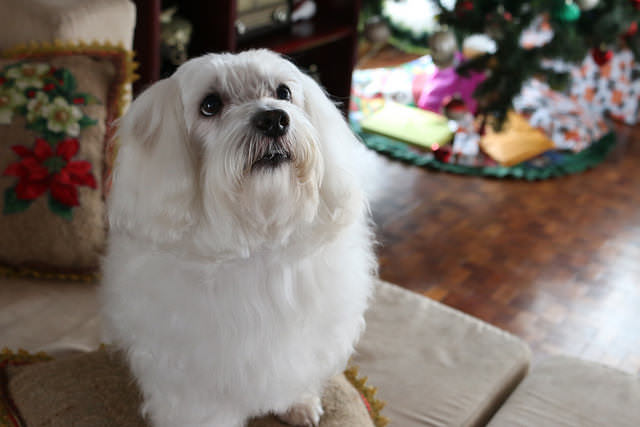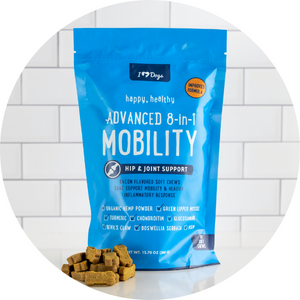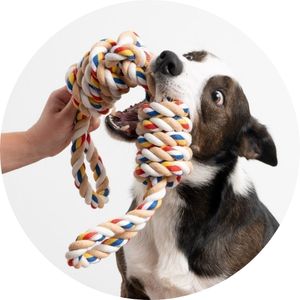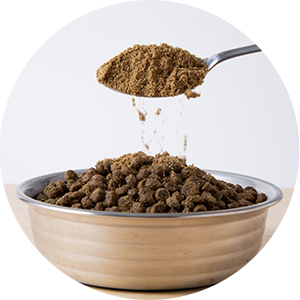The Maltese is a small dog, only reaching between four and seven pounds when full-grown. Unfortunately, we tend to spoil these princely dogs through extra food and treats that can make their tiny bodies balloon up. With over half the dog’s in the United States and the United Kingdom obese, it’s important to look at your Maltese often and make sure they are not getting too pudgy. Overweight dogs have many more health problems than trim dogs, including shorter lives. The following are three signs your Maltese is overweight. If you suspect yours might be, take her to the vet to be checked out and to discuss a diet and exercise plan.
How Much Should Maltese Weigh?
6 to 9 Lbs

#1 – No Definition
A maltese should have a fairly deep chest and a rounded rib cage that tucks up to the “waist” (loins). If you can’t feel his ribs or tell where his rib cage ends and his hips begin, it’s probably time to diet. Dr. Sophia Yin’s website has a great, easy to follow guide for checking this.
#2 – Unable To Reach That Itch
Does your Maltese try to scratch her ear and just can’t reach? Or maybe she can’t bite herself without a struggle. If they are overly round, grooming becomes impossible. If that’s the case, then it’s time to diet.
#3 – Easily Overexerted
Do you walk a few steps and your Maltese is already panting and wanting to stop? Barring hot weather, this is a sign that he is out of shape and probably overweight. It’s time to talk to the vet about a diet and exercise regimen that will slowly get him back on track. Be careful about pushing your Maltese to exercise more than their body can handle – that can cause other issues.
Frequently Ask Questions:
People often wonder how long it will take for their Maltese to grow and how much they should weigh as puppies and as adults. Maltese dogs are usually small, but their weights vary from dog to dog and do not depend on their age. Their weight depends a lot on you, too, as you control their eating and exercise. Take a look to see what you should know about your dog’s weight.
How Can I Get My Maltese To Lose Weight?
Before making any changes to your dog’s diet or regular exercise, it’s best to check with your vet to see if there are any underlying health problems. Even though food and exercise are usually the main causes of weight gain, underlying health problems like hypothyroidism and diabetes should be ruled out first.
Next, you must ensure your pet is getting the right food. The serving sizes on a bag of dog food are not just suggestions; they are the right amounts for each size of the dog. Also, avoid foods that are high in carbs or sugar. You may need to switch your dog’s kibble to one without grains because carbs are known to cause weight gain that cannot be stopped.
Next, there are treats for dogs that have different ingredients and different amounts of calories. Most dog treats have too many calories, which is a shame. Even though your Maltese loves to eat your leftovers, it’s bad for her health. Specially made human food from a box or can is full of preservatives, salts, and other chemicals that neither humans nor dogs can break down well.
How Do I Know If My Maltese Is Overweight?
If you want to know if your Maltese is too fat, examine her ribs. It’s the easiest way to tell if your Maltese is too heavy or too thin. At a healthy weight, you should be able to feel your Maltese ribs, which should have a thin layer of fat on top of them. But if your Maltese is overweight, it might be hard to feel their ribs because of the extra fat padding.
Next, check the hip contours and feel for a slight depression between the ribs and hips. When you look at it from above, it often looks like an hourglass.
When a Maltese is too skinny, the contour is too obvious, but when a Maltese is too fat, the contour is hard to see. Obese dogs have less energy, too, but the best way to know if your Maltese is at a healthy weight is to take them to the vet for a checkup.
How Much Exercise Does A Maltese Need?
The Maltese may be a toy breed, but these dogs have a lot of energy and enjoy playing. You should take your Maltese out for a walk for around half an hour each day so that they may expend all of the excess energy they have and so that you can keep up a healthy lifestyle. Then, bring them to a safe place where they may run around unrestrained to explore and let loose.
How Much Should A Maltese Eat A Day?
The recommended daily amount is between 1/4 and 1/2 cups of high-quality dry food, which should be split between two meals. Do not let your Maltese get fat by leaving food out all the time. Instead, measure his food and feed him twice a day. The amount of food your adult dog needs depends on his size, age, build, metabolism, and activity level.
Just like people, dogs are all different, so they do not all need the same amount of food. It’s almost a given that a dog who likes to run around will need more than a dog who likes to sit around. The quality of the dog food you buy is also important. The better the dog food, the more it will feed your dog, and the less you’ll have to shake it into her bowl.
How Often Should You Walk Maltese?
A Maltese may be tiny but does best with two walks a day at the very minimum. You should take them for a stroll either in the morning or in the evening. Strive to walk at a speed that is appropriate for the Maltese breed, as they are tiny with little legs. You will want to make sure that he is trotting easily, with a comfortable stride.
The duration of the walk should be at least 20 minutes, but the majority of Maltese people are comfortable with it lasting up to 30 minutes. You are welcome to take your Maltese on even longer walks or to any kind of event in which there will be a lot of walking; however, you will want to plan for a break approximately every 20 minutes or so for your puppy or dog to rest.
What Is A Maltese Supposed To Weigh?
Even though the breed standard says that a Maltese should weigh less than 7 pounds, a healthy weight for an adult Maltese is between 4 and 6 pounds. A larger Maltese may still be healthy, up to 8 pounds. Some dogs’ bones are a little bit bigger, so they weigh a pound or so more than 7 pounds is not unusual and is nothing to worry about.
What Is Overweight For A Maltese?
Once a Maltese reaches 9 pounds, it will be up to the vet to figure out if the dog’s bones are bigger than expected or if the dog is just too heavy. Even though it does not often happen, being overweight is not just a problem for medium and large dog breeds. Even dogs with good bone structures can gain too much weight.
What Is The Best Food For A Maltese?
Most dogs prefer wet dog food to dry, but they need a mix for health reasons. For example, wet food alone can cause diarrhea, while dry kibble helps their teeth to stay strong and clean. Dry kibble is preferable for most Maltese, but you can mix in some wet food or pour low-sodium chicken or beef broth over the kibble if your dog needs a little encouragement.
Give your dog a daily dental chew if you choose wet dog food or home cooking. Poor quality dog food causes problems as fillers are added to cheap dog food to boost volume. Fillers have few calories and are not absorbed by the body; they are excreted without providing nutrition. Maltese perform better with small toy breed kibble. This makes eating easier for puppies and dogs with small mouths and teeth.
What Vegetables Are Good For Maltese?
Choose different kinds of vegetables to make up no more than 30% of your Maltese diet. Your Maltese can eat squash, green beans, sweet potatoes, etc. Dogs cannot digest other vegetables like onions, tomatoes, red beets, spinach, and kale because their digestive systems are short.
Why Is My Maltese Gaining Weight?
Maltese dogs are small, weighing between 4 and 7 pounds. Because they are so small, it does not take much for them to get fat. So, if you want to keep them from getting fat, you should keep an eye on how many calories they eat and how much weight they gain. Next, giving your Maltese table scraps could harm their health. A Maltese cannot take human food’s daily calories, fat, and sodium.
Inactivity is another reason Malteses grow weight. If they do not move, they may acquire weight, especially if you carry them everywhere. Finally, give your Maltese a healthier snack after a workout. Since you already watch their food, it’s crucial to watch the calories in their sweets. Turkey bacon and chicken breast treats have less sugar and more protein.
Overweight Breed Informational Pages
- Is My Bulldog Overweight Or Obese?
- Is My Chihuahua Overweight Or Obese?
- Is My Corgi Overweight Or Obese?
- Is My Dachshund Overweight Or Obese?
- Is My Doberman Overweight Or Obese?
- Is My German Shepherd Overweight Or Obese?
- Is My King Charles Spaniel Overweight Or Obese?
- Is My Lab Overweight Or Obese?
- Is My Maltese Overweight Or Obese?
- Is My Pit Bull Overweight Or Obese?
- Is My Pomeranian Overweight Or Obese?
- Is My Rottweiler Overweight Or Obese?
- Is My Shih Tzu Overweight Or Obese?
- Best Joint Supplement for Dogs
- Best CBD Gummies for Dogs
- Goat's Milk for Dogs
- Skin & Coat Supplements for Dogs
- Weight Gain Supplements for Dogs
- Muscle Building Supplements for Dogs
- Heart Supplements for Dogs
- Multivitamins for Dogs
- Pill Pockets for Dogs
- Digestive Enzymes for Dogs
- Turmeric for Dogs
- Liver Supplements for Dogs
- Tear Stain Supplement for Dogs
- Breath Fresheners for Dogs
- Kidney, Urinary, & Bladder Supplements for Dogs
- Stool Eating Deterrent for Dogs
- Eye Supplements for Dogs
- Melatonin for Dogs
- Apple Cider Vinegar for Dogs
- Green Lipped Mussels for Dogs
- L Theanine for Dogs
- Chondroitin Supplements for Dogs
- MSM for Dogs
- Valerian Root for Dogs
- Chamomile for Dogs
- Boswellia for Dogs
- L Tryptophan for Dogs
- Yucca for Dogs
- Licorice Root for Dogs
- Bromelain for Dogs
- Papain for Dogs
- Devil's Claw for Dogs
- Quercetin for Dogs
- Hemp gummy for dogs
- Best Hemp Dog Treats
- Best Hemp Oil for Dogs
- Best Calming Treats, Chews, & Supplements for Dogs
- Best Bone Broth for Dogs
- Best Fish Oil for Dogs
- Best Probiotics for Dogs
- Best Hip Dysplasia Supplements for Dogs
- Best Colostrum for Dogs
- Best Quercetin for Dogs
- Best Greens for Dogs Supplements
- Best Vitamin C Supplements for Dogs
- Best Probiotic for Dog with Allergies
- Best Taurine Supplements for Dogs
- Best Dog Food Toppers
- Best Anal Gland Supplement for Dogs
- Best Dog Probiotic Powder
- Best CoQ10 Supplement for Dogs
- Best Liquid Glucosamine for Dogs
- Best Wrinkle Creams, Balms, and Wipes for Dogs
- Best Puppy Calming Treats
- Best Colloidal Silver for Dogs
- Best Adaptogen Supplements for Dogs
- Best Cognitive Supplements for Dogs
- Best Bee Pollen for Dogs
- Best Vitamin A Supplements for Dogs
- Best Vitamin E Supplements for
- Best Liquid Glucosamine Supplements for Dogs
- Best SAM-e Supplements for Dogs
- Best Hyaluronic Acid Supplements for Dogs
- Best Apple Cider Vinegar Supplements for Dogs
- Best Diarrhea Medicine for Dogs
- Best Milk Thistle for Dogs
- Best Turkey Tail Mushroom Supplements for Dogs
- Best Astaxanthin Supplements for Dogs
- Best Lutein Supplements for Dogs
- Best Electrolyte Supplements for Dogs
- Best Coconut Oil for Dogs
- Best Prenatal Vitamins for Dogs
- Best Puppy Milk Replacements
- Best Iron Supplements for Dogs
- Best Dewormer Products for Dogs
- Best Mange Medications for Dogs
- Best Cough Relief Products for Dogs
- Best Sinus Relief Products for Dogs
- Best Collapsed Trachea Supplements for Dogs
- Best Fireworks Anxiety Relief Products for Dogs
- Best Thunderstorm Anxiety Relief Products for Dogs
- Best Travel Anxiety Relief Product for Dogs
- Best Supplements for a Dog with a Torn ACL
- Best Supplements for a Dog with Patellar Luxation
- Best Supplements for a Dog with Intervertebral Disc Disease
- Best Zinc Supplements for Dogs
- Best Biotin Supplements for Dogs
- Best Tart Cherry Supplements for Dogs
- Best Resveratrol Supplements for Dogs
- Best Ginkgo Biloba Supplements for Dogs
- Best Ashwagandha Supplements for Dogs
- Best Supplements for Dogs with Cushing's Disease
- Best Adrenal Supplements for Dogs
- Best NAD+ Supplements for Dogs
- Best NMN Supplements for Dogs
- Best Supplements for Dogs with Dementia
- Best Supplements for Dogs with CCD(Canine Cognitive Dysfunction)
- Best Fiber Supplements for Dogs
- Best Spirulina for Dogs
- Best Hairball Remedies for Dogs
- Best Eye Drops for Dogs with Allergies
- Best Magnesium Supplements for Dogs
- Best Brushes for Double-Coated Dogs
- Best Dandelion Root Supplements for Dogs
- Best Probiotic for Dogs with Yeast Infections
- Best Flaxseed Oil for Dogs
- Best Chamomile Supplements for Dogs
- Best Lavender Supplements. Treats & Sprays for Dogs
- Best Collagen Supplements for Dogs
- Best Kelp Supplements for Dogs
- Best Activated Charcoal for Dogs
- Best Slippery Elm Supplements for Dogs
- Best Supplements for Dogs with Seizures & Epilepsy
- Best Antioxidant Supplements for Dogs
- Best Ubiquinol Supplements for Dogs
- Best Hormone & Glandular Supplements for Dogs
- Best Thyroid Supplements for Dogs
- Best Iodine Supplements for Dogs
- Best Dog Shedding Supplements for Dogs
- Best Detox Supplements for Dogs
- Best Postbiotics for Dogs
- Best Aspirin Products for Dogs
- Best Dog Anti-Nausea Products
- Best Dog Mouthwashes
- Best Camelina Oils for Dogs
- Best Hemp Seed Oils for Dogs
- Best Natural Anti-Inflammatories for Dogs
- Best Cancer Supplements for Dogs
- Best Sardine & Anchovy Oils for Dogs
- Best Fatty Acid Supplements for Dogs
- Best Chia Seed Supplements & Treats for Dogs
- Best Olive Oils for Dogs
- Best Amino Acid Supplements for Dogs
- Best Moringa Supplements for Dogs
- Best Echinacea Supplements for Dogs
- Best Cranberry Supplements for Dogs
- Best D-Mannose Supplements for Dogs
- Best Nettle Leaf Supplements for Dogs
- Best Marshmallow Root Supplements for Dogs
- Best Astragalus Supplements for Dogs
- Best Pumpkin Seed Supplement for Dogs
- Best Supplements for a Dog Wetting The Bed
- Best Blueberry Supplement for Dogs
- Best Bromelain Supplements for Dogs
- Best Yucca Supplements for Dogs
- Best Ginger Supplements for Dogs
- Best Rosehip Supplements for Dogs
- Best Allergy Medicines for Dogs
- Best Reishi Mushroom Supplement for Dogs
- Best Maitake Mushroom Supplement for Dogs
- Best Chaga Mushroom Supplement for Dogs
- Best Shiitake Mushroom Supplement for Dogs
- Best Cordyceps Mushroom Supplement for Dogs
- Best Lion's Maine Supplement for Dogs
- Have question? - Ask in our Dog Health Forum






 Toledo, United States.
Toledo, United States.
